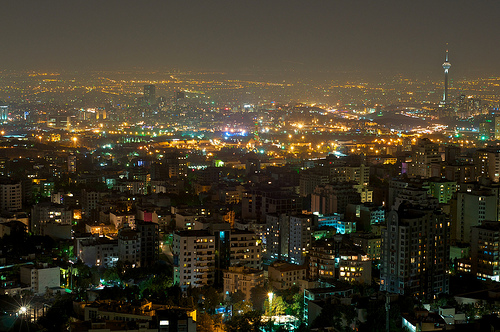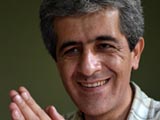A Briton in Tehran
by Yaghoub Yadali , Translated by Parvaneh Torkamani / February 7, 2014 / No comments
On support from outside and ending the sanctions.

Tehran skyline on a hot summer night. Photo: Babak Farrokhi via Flickr.
All available evidence points to the fact that the Iranian-American relationship has entered a new phase since Hassan Rouhani was elected president. Now the two countries are trying to dismantle the tall walls of mistrust between them, brick by brick. Amidst all this, there are people and groups in both countries trying to throw a wrench in the works. Of course, there are also others trying to ease the process. One such person is Jack Straw, the ex-foreign secretary of Britain who recently visited Iran as part of a British Parliamentary delegation. After he returned from Tehran, Straw wrote a short article in The Independent outlining his opinion on the relationship between Iran and America.

- “Enemy…terrorism…nuclear bomb…war.” These words are often used by American media to describe Iran. The image the media presents is often hazy, incomplete, and distorted. The political and military aspects of my country are covered mainly in a negative light.
- In Under Eastern Eyes (I have adopted the name from the novel Under Western Eyes by Joseph Conrad), I will write about those topics which American media either cannot or does not want to talk about. The emphasis will be on social and cultural aspects of Iran although, out of necessity, I will talk about politics, despite my despair.

- Yaghoub Yadali, born in 1970, is a writer and television director. His first work of fiction, the short-story collection Sketches in the Garden, was published in 1997. It was followed in 2001 by Probability of Merriment and Mooning, which was named book of the year by the Writers and Critics Award. His first novel, The Rituals of Restlessness, won the 2004 Golshiri Foundation Award for the best novel of the year and was named as one of the ten best novels of the decade by the Press Critics Award. He has also published many articles and reviews of literature and cinema in newspapers and magazines in Iran.
Straw writes that as he was going to his hotel in downtown Tehran, he was surprised to see the city’s highways and metro lines, which were built last year—under sanctions—and made Iran’s capital look “more like Madrid or Athens than it does, say, Cairo or Bombay.” He also compares the number of ministers in Rouhani’s cabinet who received their PhDs in America to those in Obama’s cabinet: “There are more American PhDs in Iranian President Hassan Rouhani’s Cabinet than there are in US President Barack Obama’s Cabinet.”
Aside from the delicate humor that exists in that sentence and his description of Tehran’s skyline, Straw tries to remind us of a point that many people have expressed in different ways: Sanctions have hurt the people of Iran more than they have prevented the advance of, say, the country’s nuclear program. An important point Straw directs at the American government is that it should take advantage of the opportunity of Iran’s new, moderate president to resolve the nuclear issue and reach an agreement in the best way possible.
The truth is that many Iranians who have tasted the bitterness of sanctions in their daily lives follow the news of Iran’s negotiations with P5+1 (the five permanent members of the UN Security Counsel and Germany) with interest and enthusiasm. They hope that both sides will come to a lasting agreement. Most Iranians inside the country whom I’ve spoken to are tired of the wordplay and diplomatic games on both sides and only wish to wake up one day to see that the price of cheese and meat and oil is the same as it was the day before. This wish is what Straw and many others recognize and support. It seems that Straw, the Briton, much more than some Iranian or American diplomats, has understood the heartfelt wishes of a large group of Iranians and allied himself in heart and voice with them.




